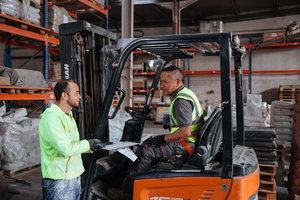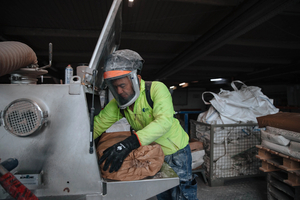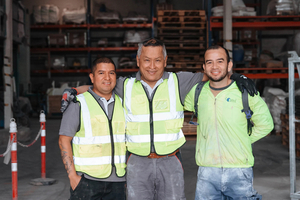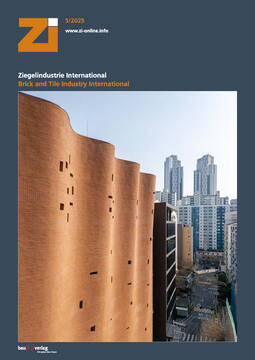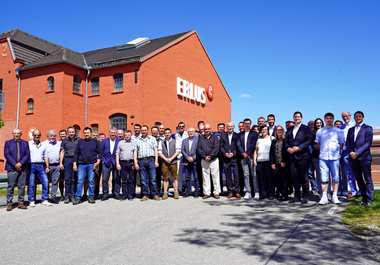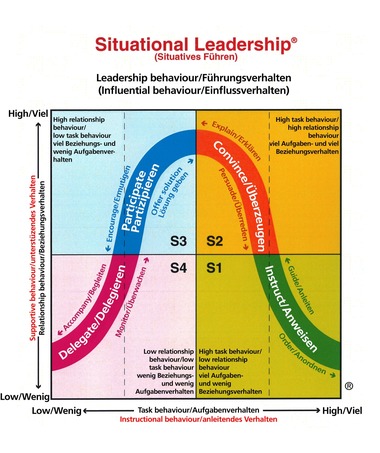On the recommendation of employees – Vitreus‘ successful approach to recruitment
New employees, especially in production, are sought after in many areas of the heavy clay industry and difficult to find. Vitreus GmbH in Seevetal, south of Hamburg, a supplier of engobes, glazes and granulates as well as raw materials, faced precisely this challenge. Traditional methods such as job advertisements and trade fairs did not yield satisfactory results. What ultimately helped to fill the personnel gap were random encounters and recommendations. The following story describes how Vitreus was able to recruit four new employees from Colombia. It shows how far a good reputation can travel, that it is worthwhile for employers to offer more than just a fruit basket, and how important immigration is for the German labour market.
From Colombia to Seevetal
The story begins with good neighbourship. Vitreus operates in an industrial park and shares a building almost 100 metres long with several other companies. One of the neighbours employed an employee named Rodrigo, who was originally from Colombia and had emigrated to Germany in search of a secure future. Due to their proximity, they knew each other. When Rodrigo‘s employer had to close down, he applied for a job at Vitreus, where there had been vacancies in production for some time. Both sides came to an agreement very quickly.
His experience as an employee at Vitreus and his knowledge of further vacancies motivated Rodrigo to recommend his son Luis, who was living in Spain seeking permanent right to stay, to his new employer. Once again, both sides were interested in each other and Luis moved from Spain to Germany to take up the job.
Both recommended a mutual Colombian friend, Wilmer, who had come to Germany as an asylum seeker, to Vitreus. Wilmer, in turn, recommended someone from his network, Didienson, also an asylum seeker from Colombia, as an employee. Like Rodrigo, both had come to Germany to live in greater security and with better prospects.
Qualifications
Professional
For Rodrigo and his son Luis, Vitreus‘ field of work was uncharted territory. However, both already had experience in activities related to production. Rodrigo, for example, had more than 10 years of work experience as a warehouse employee. At Vitreus, they knew from neighbourhood experiences that Rodrigo was good at operating a forklift truck.
Luis brought experience in cleaning, transport and logistics. They acquired other specific knowledge and skills informally while working at Vitreus. This included areas important to Vitreus such as machine operation, scaling in an industrial environment and quality control processes. Wilmer and Didienson were also new to the field and started as trainees to learn the basics of their job.
The training was so successful and satisfactory for both of them that they asked for permanent employment. Vitreus accommodated them and offered them contracts.
Vitreus trained all employees on various machines (3 powder mixers/slurry mixers/forklifts/bagging station/scales), in processing procedures and safety regulations.
Language
Communication between the new and regular colleagues at Vitreus is in simple German. With managing director Joachim Grothe, who speaks a little Spanish, the Colombians sometimes communicate directly in their native language. Vitreus offers all four German courses paid for by the company, and they also learn in their everyday working lives and from each other. So far, the language has proven to be a hurdle, but it is slowly becoming less of an issue. All four are motivated, not only because they need the language skills for their work, but also to be able to deal with the bureaucracy in Germany.
Expectations exceeded
Vitreus is very satisfied with the new employees. They perform their tasks very well and are very committed. From an economic point of view, the company says that investing time and money in the new employees has paid off. It is only with them that the company has been able to maintain efficient production and deliver orders on time.
Conversely, the four employees are also very satisfied with their employer. Rodrigo compares his current job with his previous ones in Colombia and sees many similarities. Only the earnings, but also the taxes due, are higher. ‘If you get a tax refund, it‘s a blessing, and if not, then so be it, but that‘s also the case in Colombia,’ he says. Didienson says: ‘Personally, I easily got used to Vitreus in my daily work and am satisfied with both the company and the country.’
Hurdles of German immigration laws
All four Colombians work with an official work permit. Rodrigo has permanent residence in Germany. His son Luis has a Spanish identity card and, as an EU citizen, is free to live and work in Germany. For Wilmer and Didienson, however, the future is still uncertain as they are currently in the process of applying for asylum. There is therefore a possibility that their employment may no longer be possible in the future. For example, Wilmer’s work permit is valid until 2029, depending on his residence status. If his asylum application is rejected, he will lose his residence permit and would have to leave Germany and his job at Vitreus.
Vitreus is supporting both of them in their dealings with the German authorities in order to obtain a permanent residence permit. Vitreus is also trying to help its employees in other areas. For example, the company provided Wilmer with a letter of recommendation when he was looking for accommodation and contacted landlords on his behalf.
If Wilmer and Didienson are denied permanent residence, they will have to leave Germany. For Vitreus, this would mean losing two valued, committed and qualified colleagues. For Germany, the company believes, this would also be a loss of two working and actively integrating immigrants who contribute to German society.
The recipe for success: relationships
Using the networks of existing employees to find new staff has paid off. Vitreus will continue to pursue this approach to recruitment as needed. The company‘s management is aware of the role of chance in this process. It does not accept this as an objection. After all, much in life depends on opportunities arising and being seized. This applies both to the company and to new employees. Needless to say, according to Vitreus, a good, pleasant working atmosphere and fair pay are also important. So too is the confidence of employees in the positive development of the company and their own role in it.
Vitreus is currently working on setting up a programme in which every foreign employee is assigned a mentor within the company.
‘The mentoring programme is aimed at all future foreign employees. We are currently finalising the framework, but the programme aims to integrate employees, promote/improve their language and technical skills, and strengthen their independence. The programme pursues goals in the following areas: 1) Integration into the team and the company 2) Improvement of language comprehension 3) Improvement of work quality and independence 4) Increase in job satisfaction and motivation 5) Improvement of safety, says Joachim Grothe,’ Managing Director of Vitreus.
Enriching experience
Both the company and its employees find the collaboration enriching. The contribution of Colombian culture is greatly appreciated at Vitreus, perhaps because the company is more influenced by northern German culture: ‘They have a different outlook on life – an extremely positive outlook – and that influences their environment.’
Didienson explains: ‘I think we have left a good professional reputation thanks to our work, considering that most Colombians like to give their best.’ And Rodrigo says: ‘I was someone who liked to meet new people, and my goal was to develop myself further. I finished my studies and wanted to go to university, but I couldn‘t because of personal financial problems. We have a good visa that offers us a promising employment future. Vitreus invested and made it possible; he (Joachim) didn‘t give up.’

